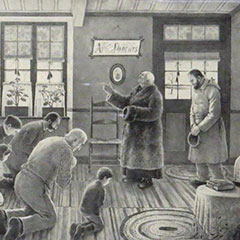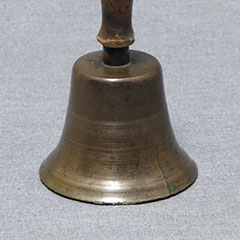The Guignolée
The “ guignolée ” tradition dates back to the New France period. Throughout the month of December, and more specifically on Christmas and New Year’s Eves, the “ guignoleux ” (meaning those participating in the “ guignolée ”) move from one house to the next to collect money and food donations for the less fortunate. Pork chine is among the most appreciated gifts, therefore people put it aside especially for this purpose when butchering for the holidays.
The “ guignoleux ” traditionally wear brightly coloured clothing – and a red tuque – and carry a bell which they merrily ring to signal their arrival. “Put some money in our pocket”, they exclaim.
Going around with the “ guignolée ” is also an excuse to celebrate. The group sings, laughs, and has fun all along the way. They stop at each house to warm their feet and throat, and to enjoy a snack. They keep going late into the night.
The well known song La guignolée is heard all along the quest, although the original version is often cut short.
Hello to the master and mistress
And to the entire household
For the last day of the year
You owe us a donation
If you do not want to give us anything
Just say so
And we will only take
Your eldest daughter
We will feed her well
We will warm her feet
We only ask for
A pork chine
That is twenty or thirty feet long
If you please
La guignolée, la guignoloche
Put some lard into my pocket!
When we were in the middle of the woods
We were in the shade
I heard the cuckoo’s call
And the dove
Little nightingale in the green forest
Little nightingale from the lovely woods
Eh! Tell my mistress
That I am dying for her beautiful eyes
Any girl who does not have a lover
How can she live?
She is always sighing
And always keeps watch
Hello to the master and mistress
And to the entire household
We have taken the habit
Of coming to see you once a year
The “ guignolée ” tradition has all but disappeared nowaday s , at least in this form. However, French speakers still call “ guignolée ” some fundraisers that are held for the less fortunate at this time of year.


